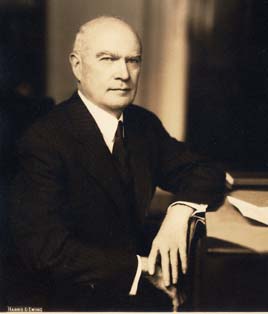- Hatton W. Sumners
Infobox_Congressman
name = Hatton W. Sumners|
date of birth = May 30, 1875
place of birth =Fayetteville, Tennessee
date of death = April 19, 1962
place of death =Dallas, Texas
state1 =Texas
district1 = At-Large
term1 = 1913-1915
preceded1 = new district
succeeded1 =A. Jeff McLemore
state2 =Texas
district2 = 5th
term2 = 1915–1947
preceded2 =Jack Beall
succeeded2 = J. Frank Wilson
party = Democratic
spouse = unmarried
profession = attorney
religion = MethodistHatton William Sumners (
May 30 ,1875 –April 19 ,1962 ) was a Congressman from Texas from 1913—1947 and served as Chairman of theHouse Judiciary Committee .Early life and career
Sumners was born near
Fayetteville, Tennessee on May 30, 1875. He moved toGarland, Texas , near Dallas in 1893. In 1895, as a 20-year-old newcomer to Dallas County, Sumners persuaded the Dallas City Attorney to let him "read law" in his office, an alternative to law school. [ [http://www.oldred.org/history/social_history_1.html| Old Red Museum, Dallas County Historical Society] ] Sumners was admitted to the bar in 1897 and commenced practice in Dallas, where he was elected prosecuting attorney of Dallas County in 1900, serving two non-consecutive terms. As prosecutor, he brought charges against gamblers in an attempt to clean up Dallas. As a result of his investigations and his campaign against drinking and vice, Sumners was not re-elected in 1902 [ [http://www.tsha.utexas.edu/handbook/online/articles/view/SS/fsu4.html| Handbook of Texas Online] ] He continued his campaign against gambling and voting irregularaties in Dallas, ultimately influencing state legislation enacted to reform the system, after which, Sumners was elected Dallas County proscutor again. Instead of continuing in that position, he instead was elected president of the district and county attorney’s association of Texas in 1906 and 1907 where he campaigned against betting interests. [ [http://www.tsha.utexas.edu/handbook/online/articles/view/SS/fsu4.html| Handbook of Texas Online] ]ervice in Congress
Sumners ran for and was elected to an at-large seat as a Democrat to the Sixty-third Congress, taking office on March 4, 1913. He was the first of the 132 freshmen congressmen in the that Congress to get a bill through the House; the bill made Dallas a port of entry for customs. [ [http://www.tsha.utexas.edu/handbook/online/articles/view/SS/fsu4.html| Handbook of Texas Online] ] In 1914, he ran for the 5th District congressional seat which included Dallas, Ellis, Rockwall, Hill, and Bosque counties and he was elected. [ [http://www.tsha.utexas.edu/handbook/online/articles/view/SS/fsu4.html| Handbook of Texas Online] ] He served on the Judiciary Committee of the House of Representatives and was appointed regularly to investigate allegations of corruption among
federal judge s, serving on the impeachment committees for three federal judges. [Congressional Biography]Sumners became Chairman of the Judiciary Committee in 1932, [ [http://www.tsha.utexas.edu/handbook/online/articles/view/SS/fsu4.html| Handbook of Texas Online] ] and as a loyal Democrat supported much of President
Franklin Roosevelt 'sNew Deal legislation. However, when the Supreme Court began invalidating key parts of the New Deal, Roosevelt proposed a plan to expand the Court, his so-called Court-packing plan was announced in 1936. As Chairman of the Judiciary Committee, Sumners discreetly worked in opposition, but as the plan was clearly in trouble, Sumners reportedly said, "Boys, here's where I cash in my chips," referring to his waning support for the President. [ [http://www.tsha.utexas.edu/handbook/online/articles/view/SS/fsu4.html| Handbook of Texas Online] ] Ultimately, Chairman Sumners came out formally against the Court-packing plan. As a consequence of this, he faced two serious opponents in the 1938 election, but Sumners was re-elected and was not seriously challenged again. In 1946, Sumners announced he would not seek re-election.Final years
After leaving Congress, Sumners was the Director of Research for the
Southwestern Legal Foundation . Having never married, Sumners formed the The Hatton W. Sumners Foundation in 1949, which still awards loans, and scholarships to worthy students.Sumners received an honorary doctor of laws from
Southern Methodist University and theAmerican Bar Association Gold Medal. He died on April 19, 1962, and after services in the Highland Park Methodist Church in Dallas was buried in the Knights of Pythias Cemetery in Garland. [ [http://www.tsha.utexas.edu/handbook/online/articles/view/SS/fsu4.html| Handbook of Texas Online] ]Books authored
Sumners wrote "The Private Citizen and His Democracy" in 1959.
References
ources
*CongBio|S001072
* [http://www.oldred.org/history/social_history_1.html| Old Red Museum, Dallas County Historical Society]
* [http://www.tsha.utexas.edu/handbook/online/articles/view/SS/fsu4.html| Handbook of Texas Online]
Wikimedia Foundation. 2010.
